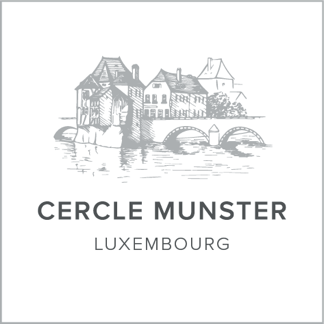Bienvenue au
Cercle Munster
Luxembourg

Le Cercle Munster
Dans les maisons datant du 17ème Siècle sises au 5-7 rue Munster sur les bords de l’Alzette dans le quartier historique du Grund, le Cercle Munster accueille ses Membres et leurs invités en toute discrétion depuis 1984.
Le Cercle Munster jouit d’une capacité d’accueil extraordinaire, permettant à ses Membres de se retrouver, pour leurs repas de famille, rendez-vous d’affaires et réceptions, dans leur « second foyer ».
De par sa taille, le Cercle Munster offre à ses Membres plusieurs lieux d’accueil, le Bar dans un style résolument anglais, le restaurant gastronomique relooké en janvier 2020 ainsi que la brasserie et le Wine lounge.
Une cave à vins d’excellence
La cave à vin, véritable fleuron du Cercle Munster abrite quelques 1500 références réparties sur près de 40 000 bouteilles de vins allant du petit producteur aux plus grands noms. Une visite de notre cave peut s’effectuer en autonomie ou, pour en savoir plus, guidée par notre sommelier afin d’explorer les recoins où sont gardés les vins rarissimes de notre collection.
Notre sommelier veillera à graver votre visite dans vos mémoires pour garder un savoureux souvenir de notre cave en vous proposant du vin mais aussi des assiettes gourmandes.
Nos lieux
Restaurant
En savoir plusUne porte lorraine, vieille de deux siècles, témoin historique de la maison, relie le bar au restaurant ; cette trace du passé rappelle la tradition du bien-être en ces lieux et de l'accueil chaleureux qui contribuent à la réputation de l'établissement. Ce restaurant gastronomique a été entièrement relooké en janvier 2020. Notre chef vous propose une cuisine de saison et des produits du marché où l’accord mets et vins ne manqueront pas de vous surprendre.
Foyer
En savoir plusLe Foyer fait office de salle d’exposition d’œuvres d’artistes parrainés par les Membres. Il est également le lieu d’accueil et de rencontre du Cercle.
Bar
En savoir plusConçu dans un style résolument anglais, notre bar vous invite à y passer un moment agréable. Vous y trouverez apéritifs et digestifs, liqueurs raffinées, cocktails pétillants, bières et vins ainsi qu'une large sélection internationale de whisky, rhum, gin et autres : dites-nous ce que vous aimez et nous nous adapterons à vos goûts !
Bibliothèque
En savoir plusLa bibliothèque joue un rôle important dans la vie du Club. C'est ici que se tiennent les évènements culturels proposés par le CERCLE MUNSTER : conférences, projections de films, concerts de musique de chambre ou sessions de jazz et soirées de poésie. Vous trouverez toutes les informations sur les prochaines manifestions. C'est dans notre bibliothèque que les Membres se retrouvent lors des rencontres de bridge ou une partie d'échecs. C'est également ici que les apéritifs ou réceptions privées pourront être organisés.
Salles et salons
En savoir plusLes salles et salons privés du Cercle Munster offrent aux Membres et à leurs invités un cadre exceptionnel pour l’organisation de leurs séminaires, petits déjeuners, déjeuners, dîners, réunions ou cocktails.
Brasserie, véranda et terrasse
En savoir plusEntièrement rénovée en 2018 et agrémentée d’une magnifique véranda et d’un salon « Wine Lounge » sublimé par une vitrine œnothèque, la brasserie est un lieu décontracté, idéal pour passer un bon moment entre amis autour d’une bonne bouteille de vin et d’un repas convivial. L’été, la terrasse ombragée au bord de l’Alzette, vous offre un moment d’évasion à tout moment de la journée.
Fumoir
En savoir plusRéservé aux amateurs de bons cigares le Fumoir est un lieu intime où vous pourrez vous retrouver en afficionados pour échanger vos impressions en savourant un beau module et, si vous le désirez, l’un des nectars dénichés dans la carte du bar.
Pourquoi devenir Membre ?
- Un Club composé de Membres privilégiés
- Un restaurant et une cave d'exception
- Des évènements exclusifs
- 181 Cercles affiliés à travers le monde
Le Cercle Munster Luxembourg, un lieu institutionnel dédié à votre service et votre satisfaction.



Un lieu emblématique
Le Cercle Munster vous accueille
du lundi au vendredi de 11h00 à 01h00
ainsi que le samedi de 18h00 à 01h00
De 8h00 à 11h00 sur réservation
(sauf les dimanches, et jours fériés).

